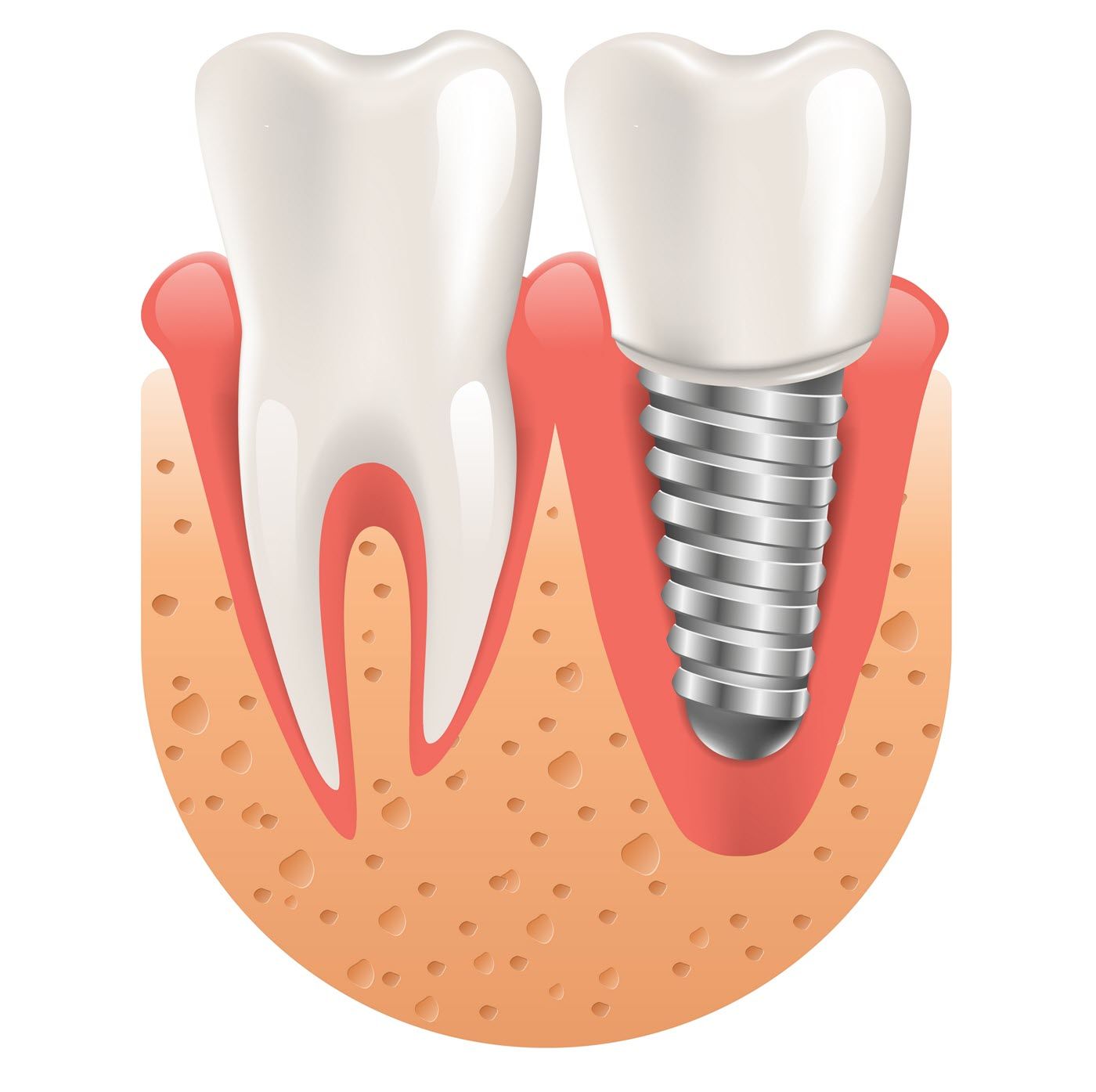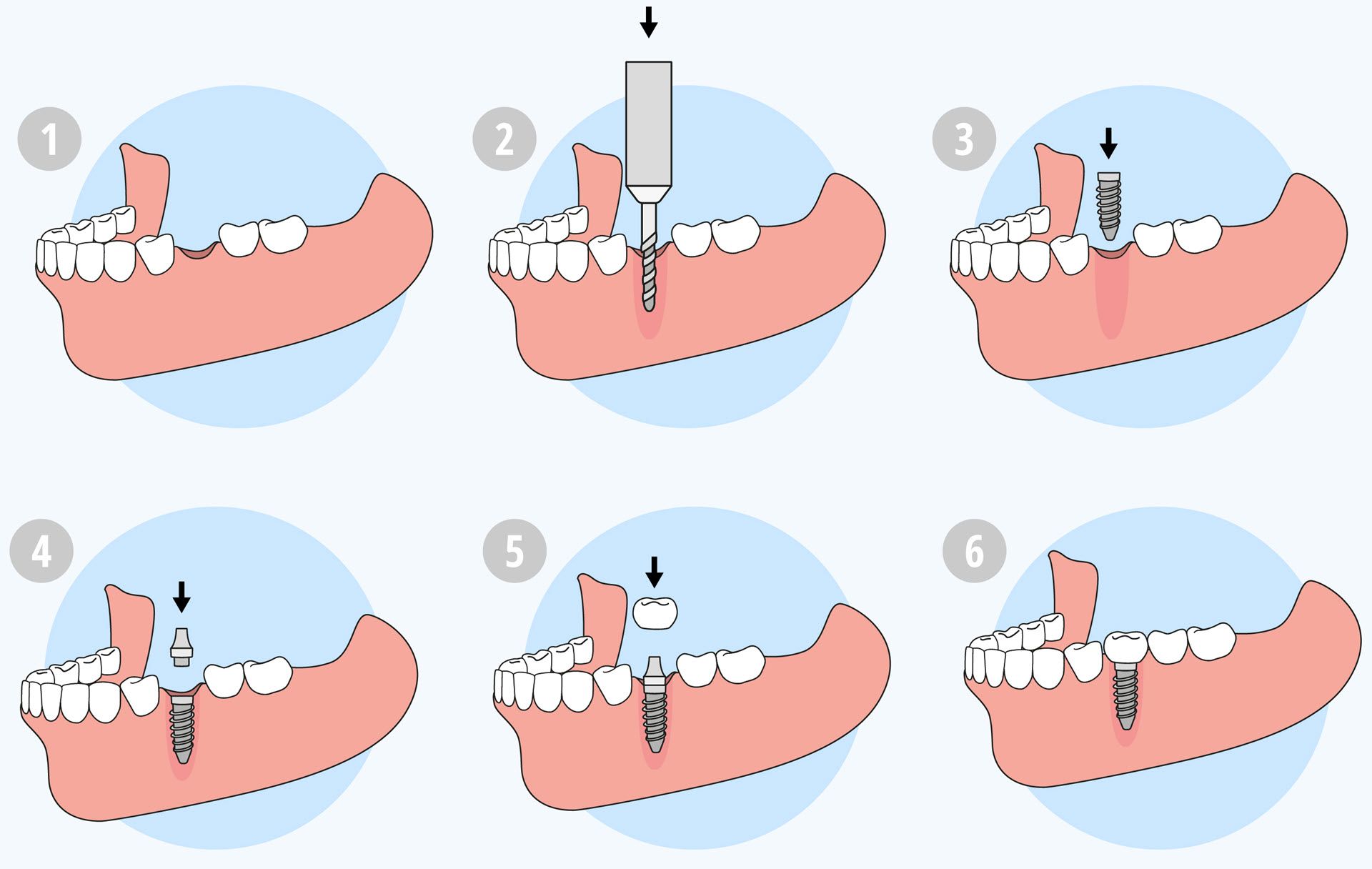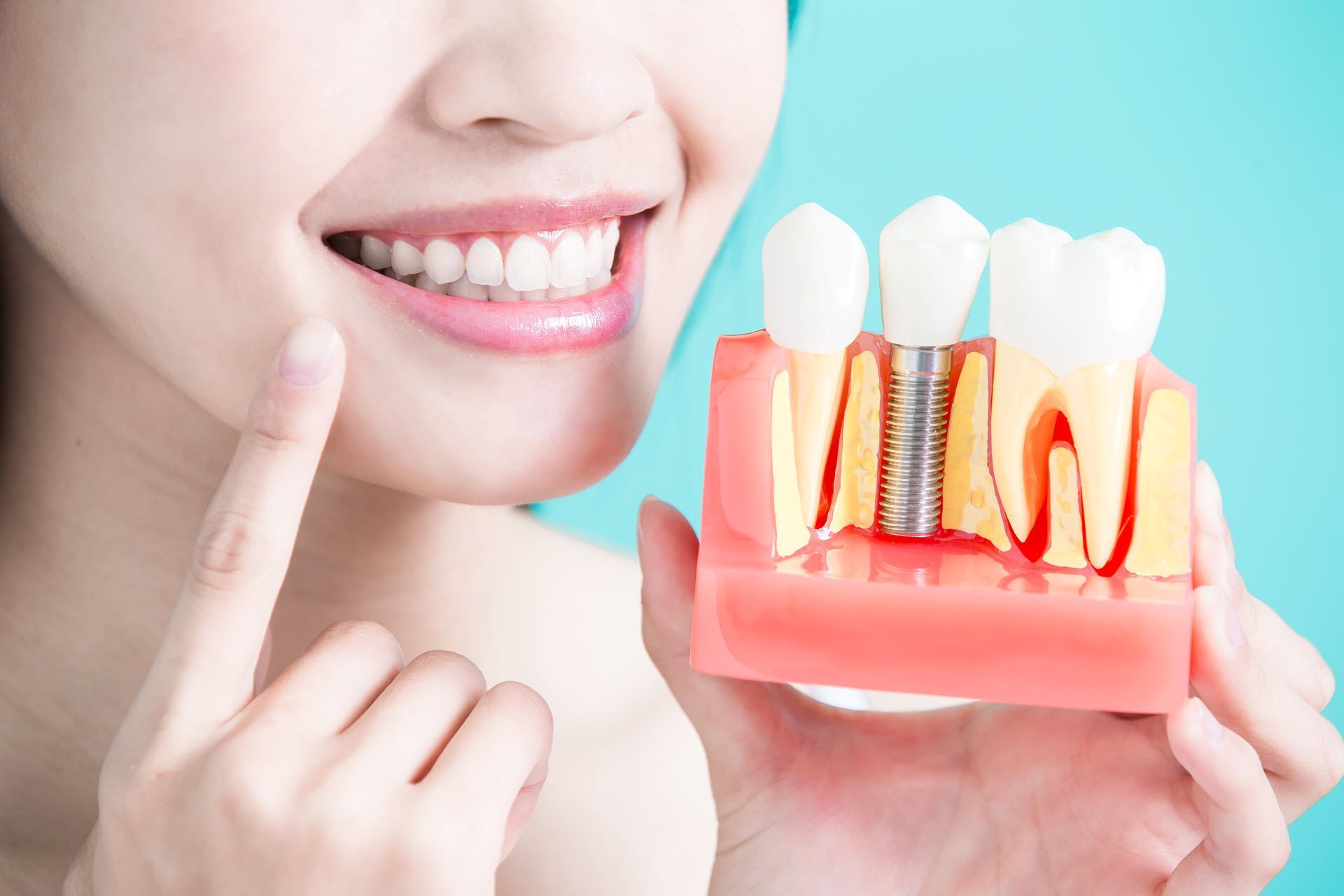Dental Implants
Permanent Solution that Looks and Feels Natural
Through dental implants, you can replace a single missing tooth or multiple missing teeth without compromising the strength of your remaining teeth.
Dental implants are a great option for replacing missing teeth because they provide a permanent solution that looks and feels natural. They also help to preserve the structure of your jawbone, which can prevent further tooth loss.
What is Dental Implants?
Dentistry has come a long way in the last ten years, with modern technology and materials capable of doing things that were once deemed impossible. This is fantastic news for anyone considering dental implants to replace missing teeth.
Dental implants are a great option for those who have lost teeth due to injury, decay, or gum disease. They provide a permanent solution that looks and feels natural despite being artificial teeth. The implant is placed directly into the jaw bone and acts as an anchor for the replacement tooth. This helps to keep the replacement tooth in place and prevents it from shifting or becoming loose over time.
Titanium Dental Implants
In the early 1950s, Swedish scientist Per-Ingvar Branemark discovered that titanium could become bound to bone and named this process osseointegration.
Titanium is utilized in a variety of medical treatments, such as dental implant procedures and tooth root replacement for artificial teeth since advancements have been made in the systems used.
Dental Implants Procedure
The implant procedure takes place over two sittings. First, a titanium thread is inserted into the cavity left by your removed tooth. Three to six months later – after your implant successfully anchors in your jaw – a beautiful custom crown will be placed.
Success Rates for Dental Implants:
The 90% for the upper jaw and 95% for lower jaw implants, based on figures over five years. Upper jaw implants have a higher risk of failure because the bone is less dense than the lower jaw, making successful implantation potentially more difficult to achieve.
If you have missing teeth, book your appointment today for a dental implant in downtown Toronto, at our dental office located in the PATH between the Exchange Tower and First Canadian Place.
Dental Implants at Artin Dental Clinic
Research has revealed that dental implants tend to last a lifetime, which can ultimately save you both time and money compared to bridges, which usually need to be redone 2-3 times within a person's lifetime.
Dental implants can be beneficial to those with ill-fitting dentures, providing an anchor that keeps the denture in place and eliminates uncomfortable shifting and movement.
Dental Implants in Downtown Toronto
At Artin Dental Clinic, we specialize in dental implants and have been providing our patients with quality care for over 20 years. Our team of experienced dentists and specialists is dedicated to helping you achieve the smile you’ve always wanted.
We use the latest technology and materials to ensure that your dental implant procedure is as comfortable and successful as possible. We also offer a variety of payment options.
Dental Implants Benefits
- Stronger, more durable and have a much higher success rate than traditional bridges and dentures.
- Proven to prevent bone loss and avoid further damage to your remaining natural teeth.
- Comfort and convenience and the healing process is quick
- Indistinguishable from your natural teeth and helps your overall oral health.
- Eat the foods you love.
Use cases of Dental Implants:
- To replace single or multiple missing teeth without grinding down or destroying neighboring teeth.
- To support a dental bridge for the replacement of multiple missing teeth.
- To anchor dentures in order to increase stability and reduce gum tissue irritation.
Book an Appointment
Book an appointment today with our doctors to discuss dental implants
Frequently Asked Questions
-
What is a Dental Implant?
precision-made titanium screw that is anchored into your jawbone where it serves as a post for a custom-made tooth crown. Once integrated into the bone, implants are the most reliable and predictable form of restoration for missing teeth.
-
Are Dental Implants Safe?
Yes, dental implants are a safe and effective way to replace missing teeth. They are made of titanium, which is biocompatible with the human body, and have been used in dentistry for over 30 years. The success rate for dental implants is very high, with studies showing that up to 95% of implants last for 10 years or more.
-
Are dental implants always successful?
The chance of the implant not bonding to the bone or failing after some time is minimal; however, should this happen, the implant can be taken out and usually replaced with a new one.
The success rate of dental implants is very high, with studies showing that 90% of upper jaw implants and 95% of lower jaw implants are successful after five years. However, the success rate can vary depending on the patient’s overall health and oral hygiene habits. It is important to maintain good oral hygiene practices and visit your dentist regularly to ensure the best possible outcome for your implant.
-
How are the teeth attached to the implant?
Once osseointegration has been achieved, a minor operation is done to reveal the surface of the implant and affix a small post into the jaw bone. Afterward, the new tooth or teeth are custom-made to fit snuggly onto the post.
The new tooth or teeth are then secured to the post with a special dental hook. This process is usually done in one visit and the patient can leave with their new, beautiful smile.
Once the implant has been placed, regular visits to your dentist are necessary to ensure that it is functioning properly and that there are no signs of infection or other complications. It is also important to maintain good oral hygiene.
-
How long does a dental implant procedure take?
Placing your implants typically takes around 20-30 minutes each, while uncovering them and attaching the abutments usually takes under an hour, depending on the number of implants being worked with.
The entire process from start to finish can take anywhere from 3-6 months, depending on the complexity of the case and the healing time needed for the implant to integrate with your jawbone. During this time, you may need to visit your dentist multiple times for checkups and adjustments. After the implant is fully healed, a custom-made crown will be placed on top of it to complete your smile.
-
How long will it take before I receive my replacement tooth?
It is generally advised to let the implants reside in the jaw uninterrupted for a span of 3 to 6 months in order for osseointegration to occur. The tooth or teeth can be affixed afterward onto the implants. Several new methods, though, make it achievable to attach the teeth within two months. Seek more details from our team concerning this special kind of implant.
-
Are there any risks associated with dental implants?
Yes, as with any medical procedure, there are some risks associated with dental implants. These include infection, nerve damage, sinus problems, and jaw fractures. It is important to discuss these risks with your dentist before undergoing the procedure. Additionally, it is important to follow your dentist’s instructions for aftercare and to maintain good oral hygiene habits.
-
How much will implant treatment cost?
The overall cost of the procedure will vary depending on how many implants are needed, where they are placed and what type of restoration best suits your needs. In general, dental implants are a wise investment for both health and lifestyle gains and Dr. Arash will be happy to discuss the associated expenses with you when you have a consultation.
-
How successful are dental implant procedures?
For more than three decades, clinical studies have shown the effectiveness of cylindrical implant systems. With over half a million people treated, these types of implants maintain their record for excellence in dental implant therapy with some of the highest success rates available.
-
Is the dental implant procedure painful?
For the majority of patients, the procedure will be comfortable and afterward, minimal discomfort may be felt. Dr. Arash will discuss with you any available anesthesia options and plan your operation accordingly; usually, it is completed with local anesthesia.
-
Will I be able to chew normally on the implant teeth?
Once treatment with cylindrical implant systems is complete, improved chewing efficiency should be evident after a short adjustment period and will be just as efficient as when natural teeth were present. Also, it is important to take special care of your dental implants. This includes brushing and flossing twice a day, avoiding hard or sticky foods, and visiting your dentist regularly for checkups and cleanings. Additionally, you should avoid smoking as this can increase the risk of implant failure.
-
Will my new tooth or teeth look natural?
Yes, the new tooth or teeth will look natural. The implant is designed to blend in with your existing teeth and will be customized to match the shape, size, and color of your natural teeth. Your dentist may also suggest additional treatments such as veneers or crowns to further enhance the look of your smile. If you take proper care of your implant, it can be a lifelong solution.
-
Will there be any swelling after the implant procedure?
Generally, the amount of swelling experienced is minimal and usually passes within one or two days after the operation. Your dentist will provide you with detailed instructions on how to care for your implant after the procedure. This includes taking any prescribed medications, avoiding strenuous activity, and eating soft foods for a few days. Additionally, it is important to keep the area clean and free of debris by brushing and flossing regularly.
Navigation
Services
Business Hours
- Mon, Wed, Thu
- -
- Tuesday
- -
- Friday
- -
- Sat - Sun
- Closed
All Rights Reserved | Artin Dental Office
Website & Marketing by nerDigital.com





